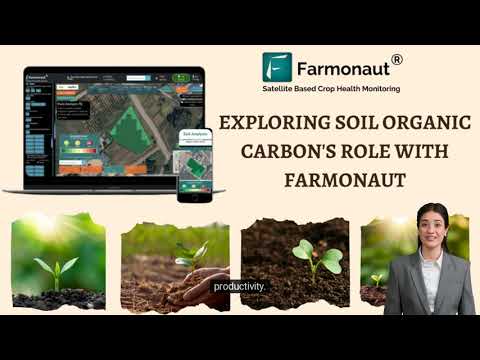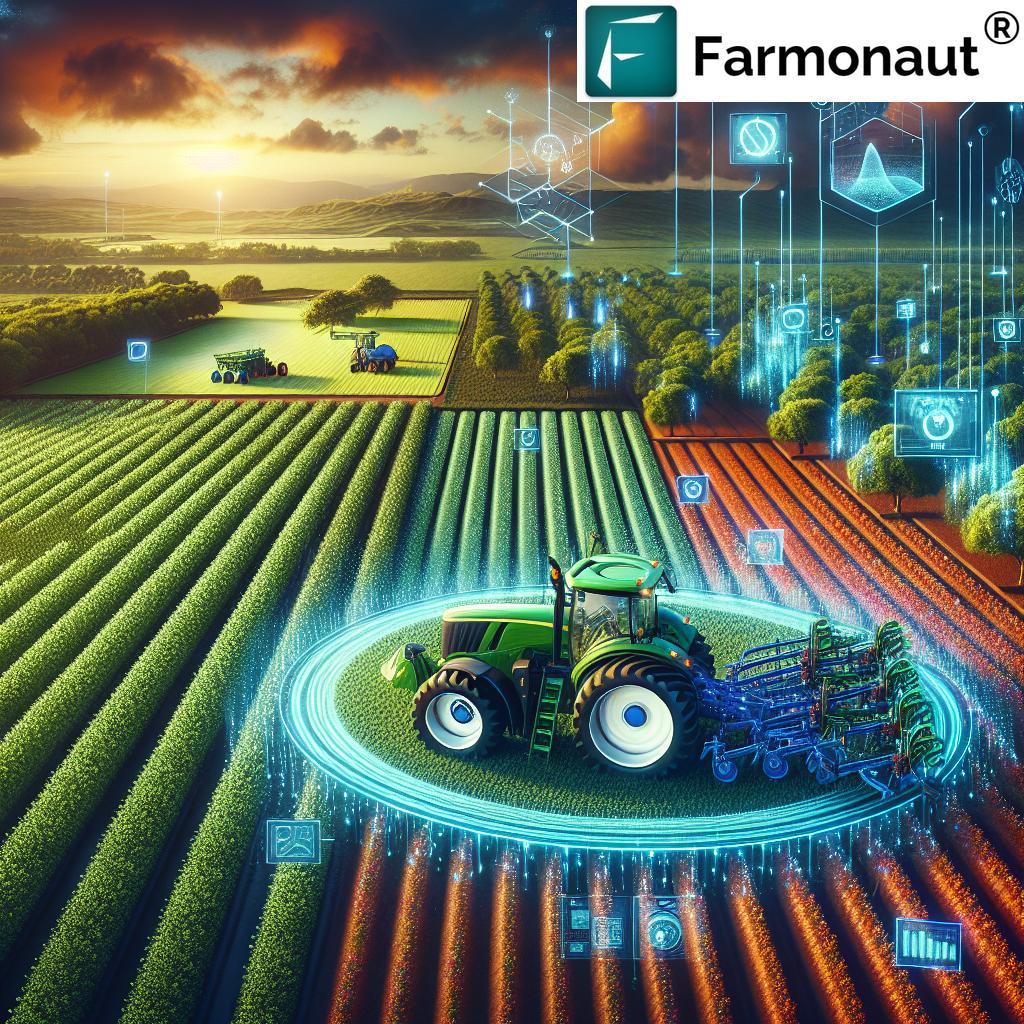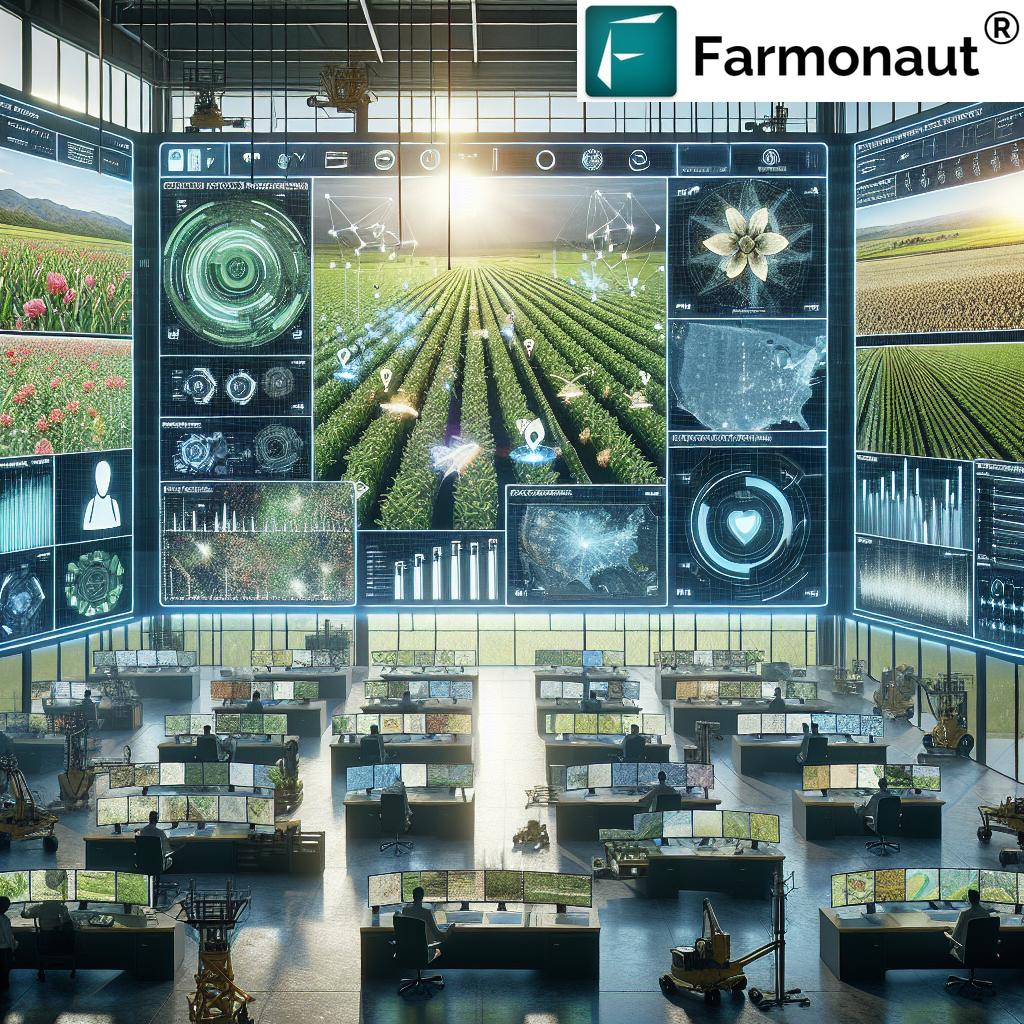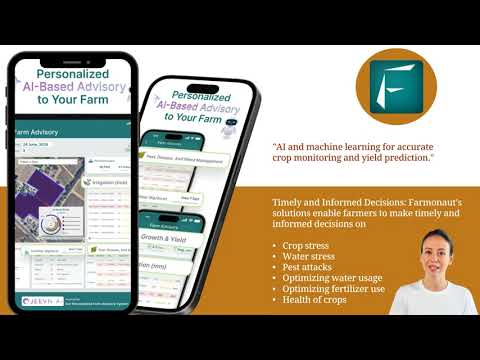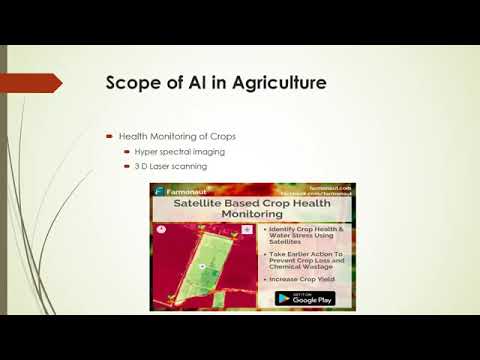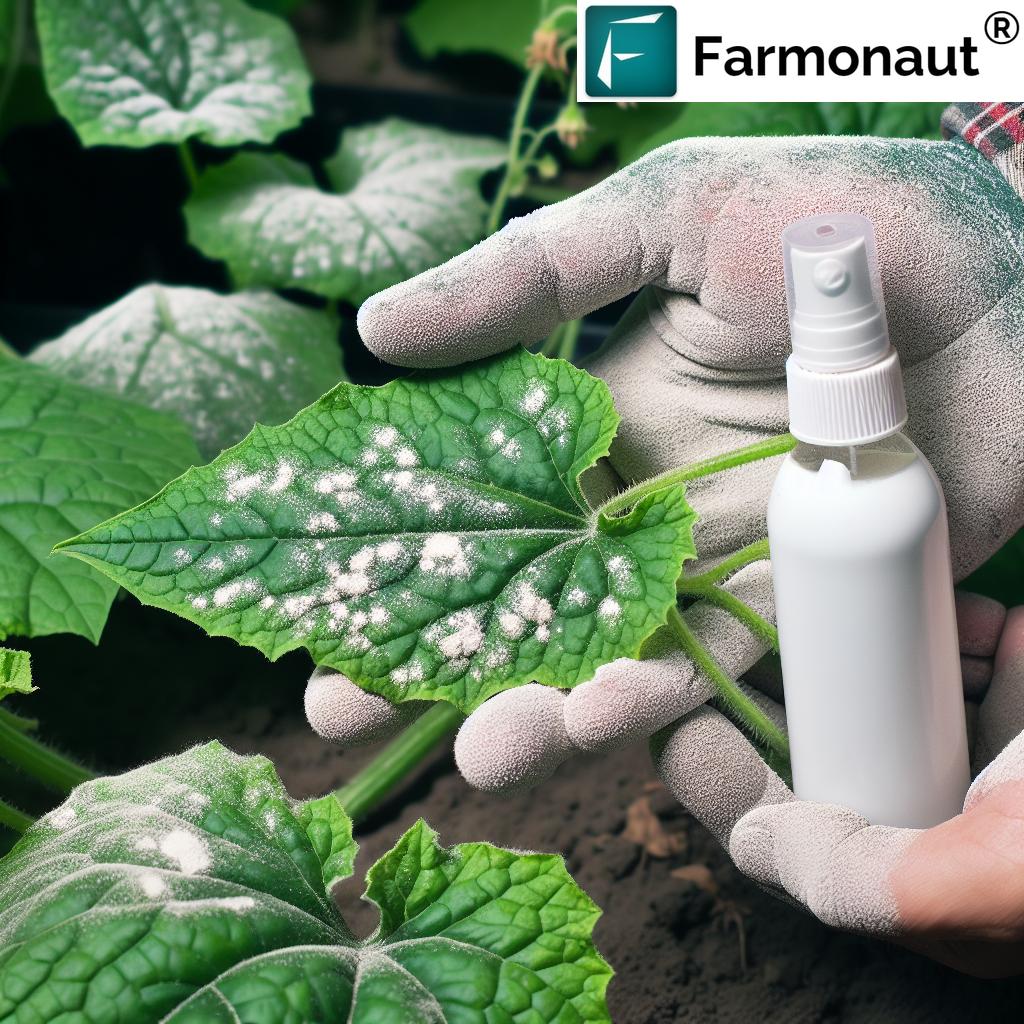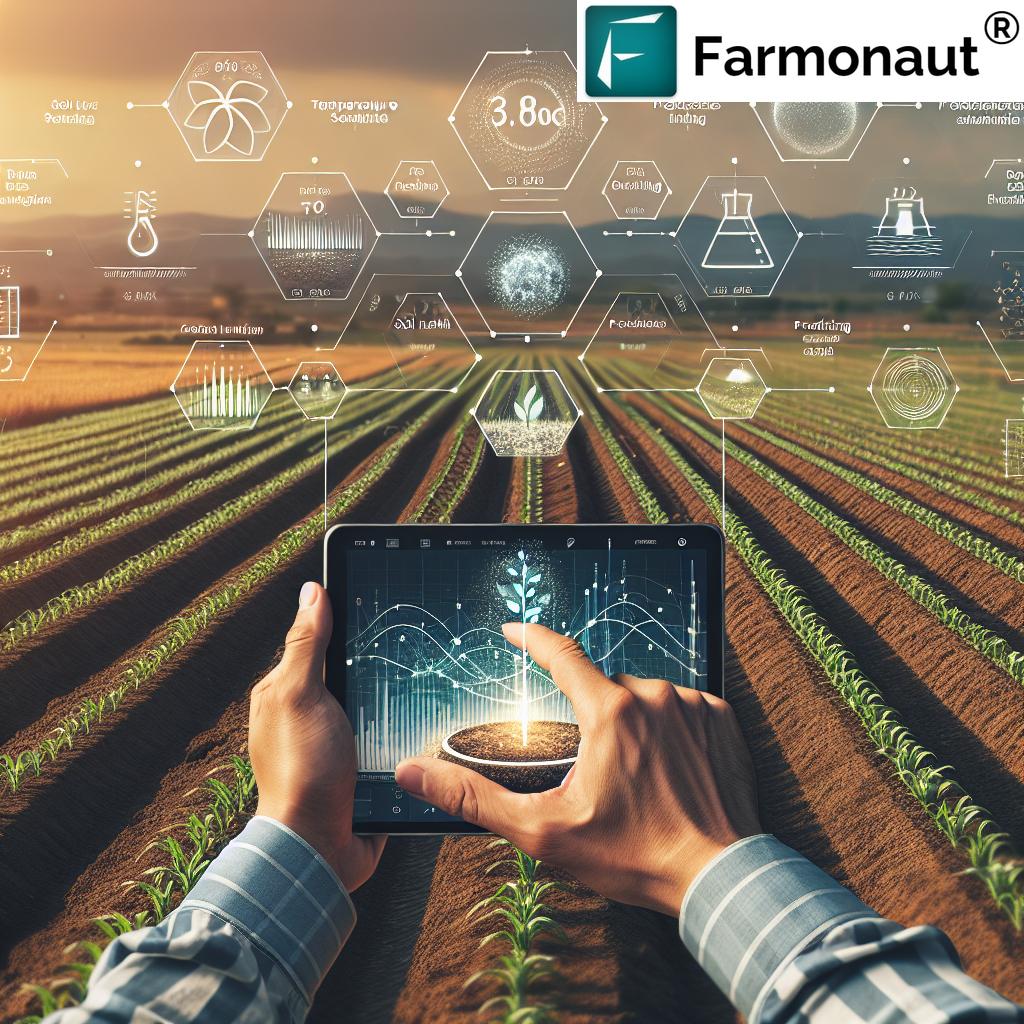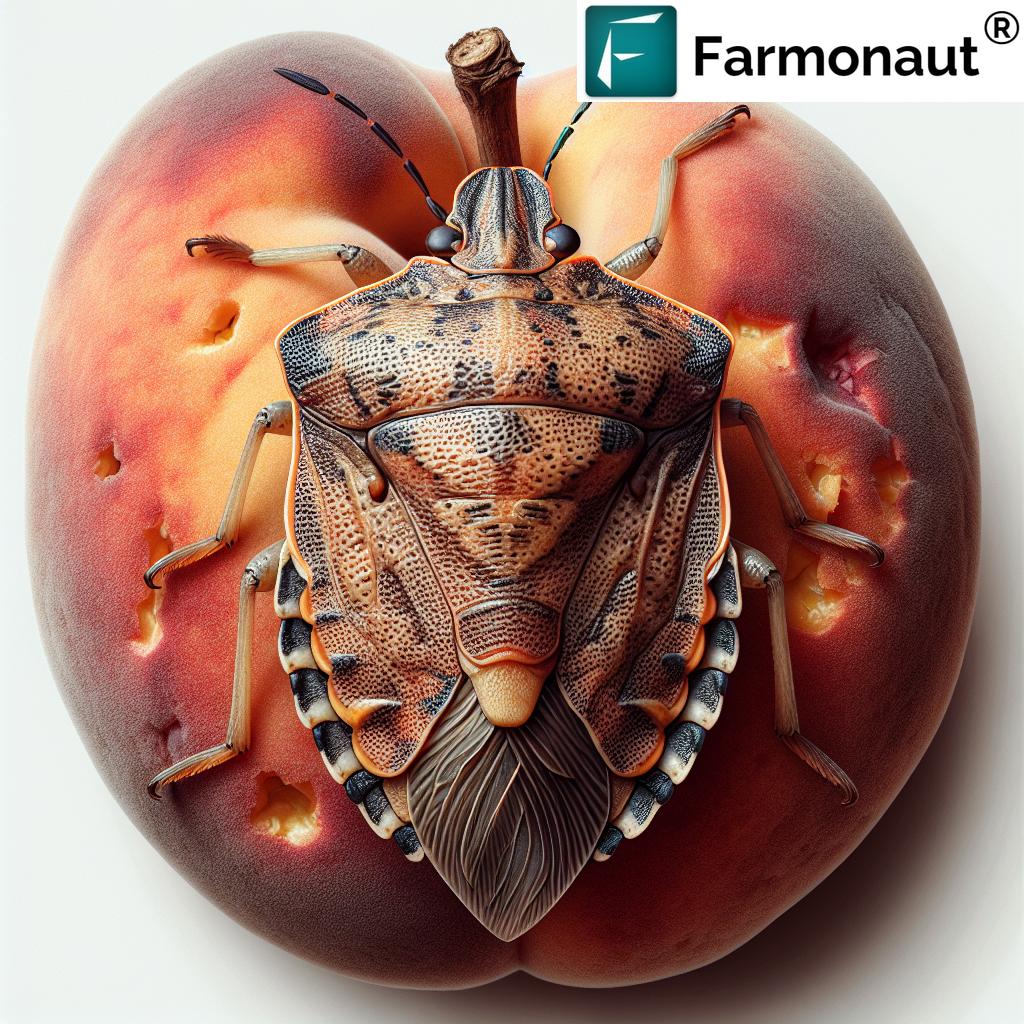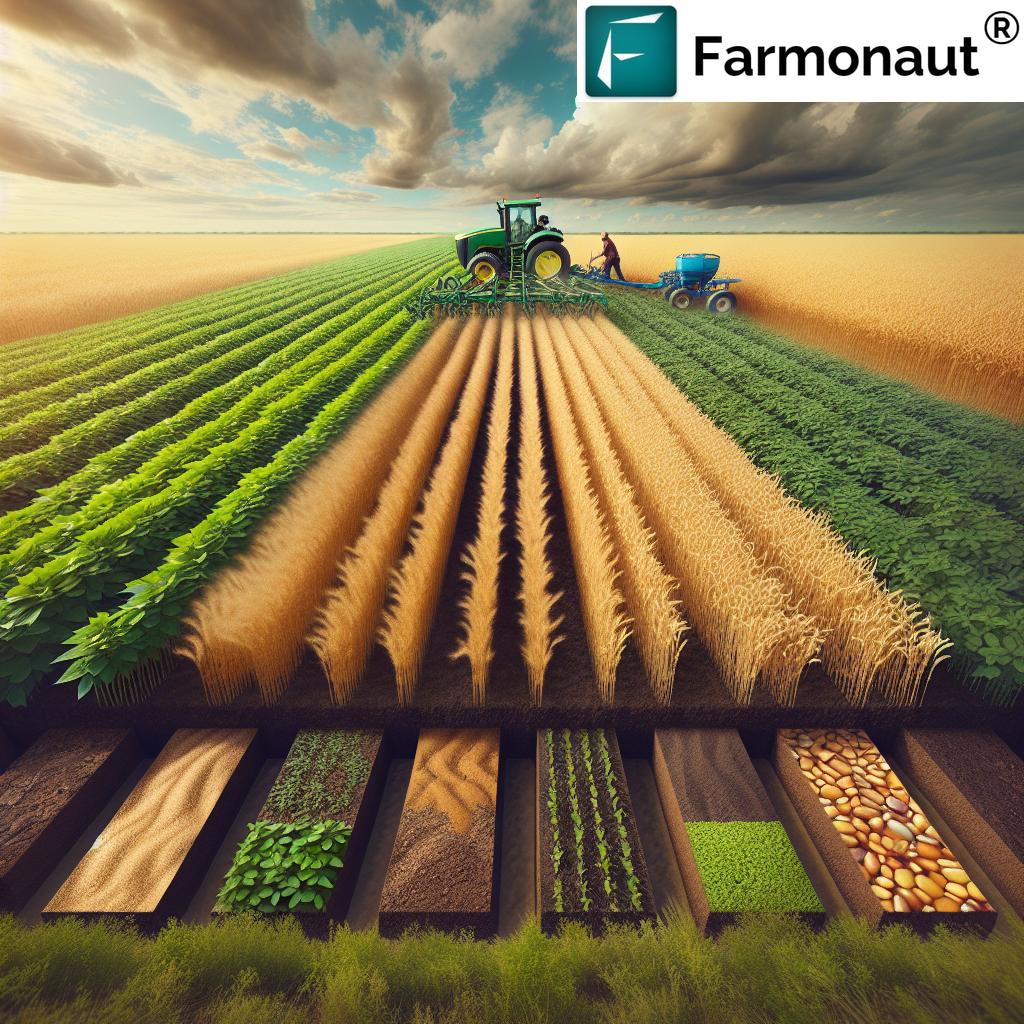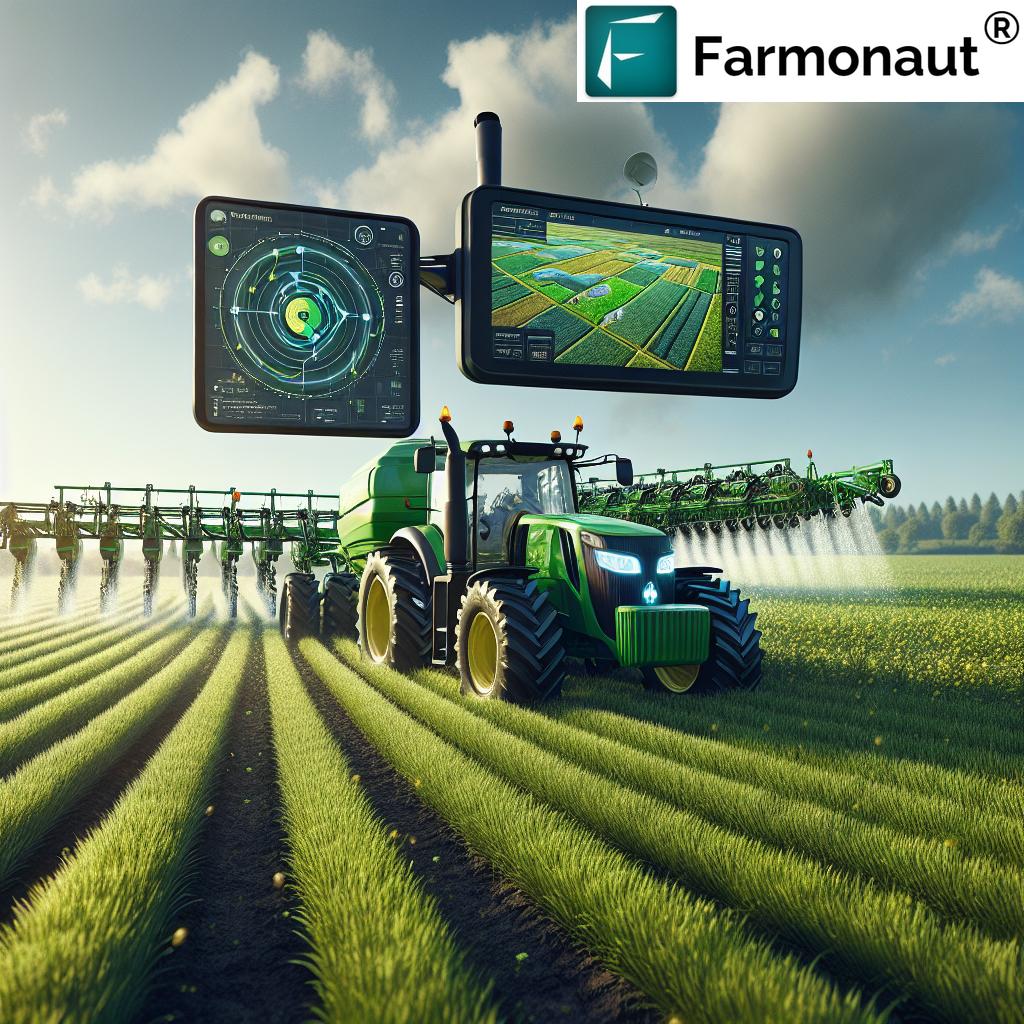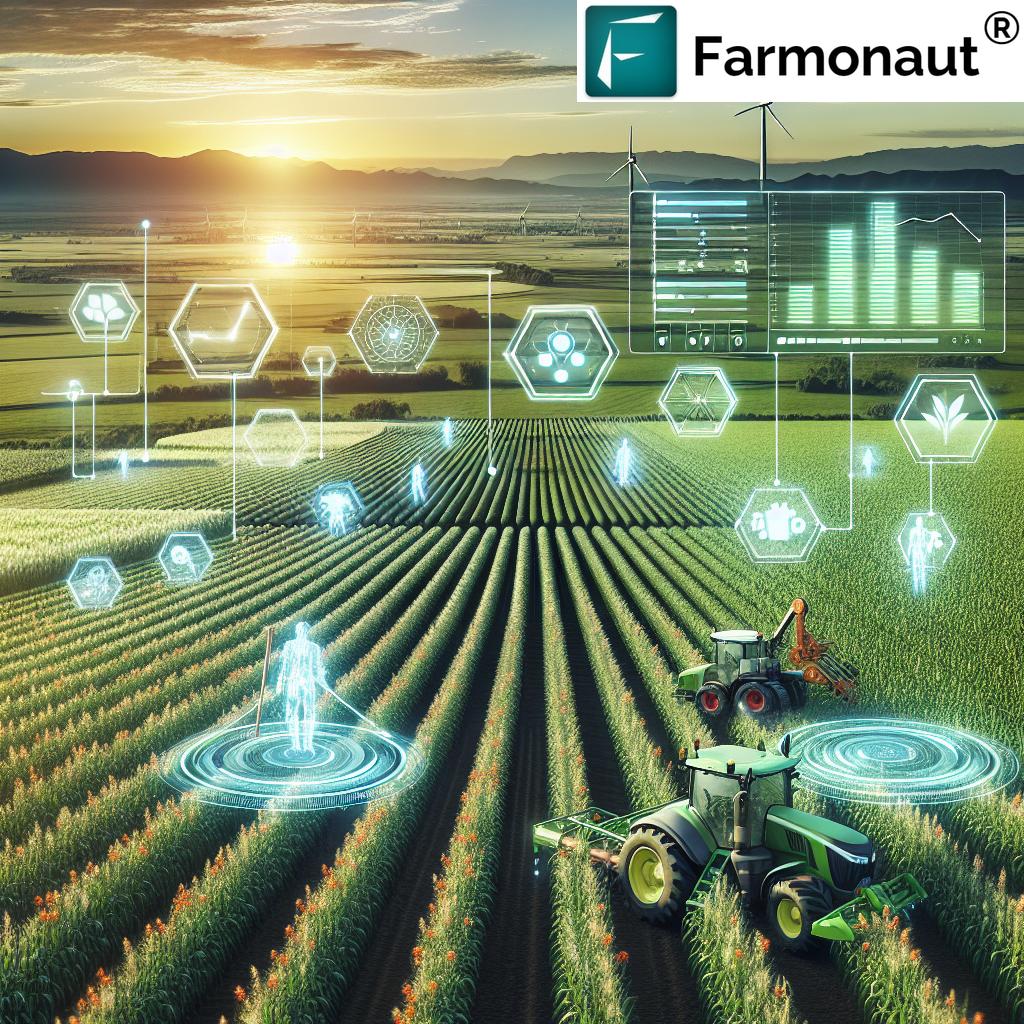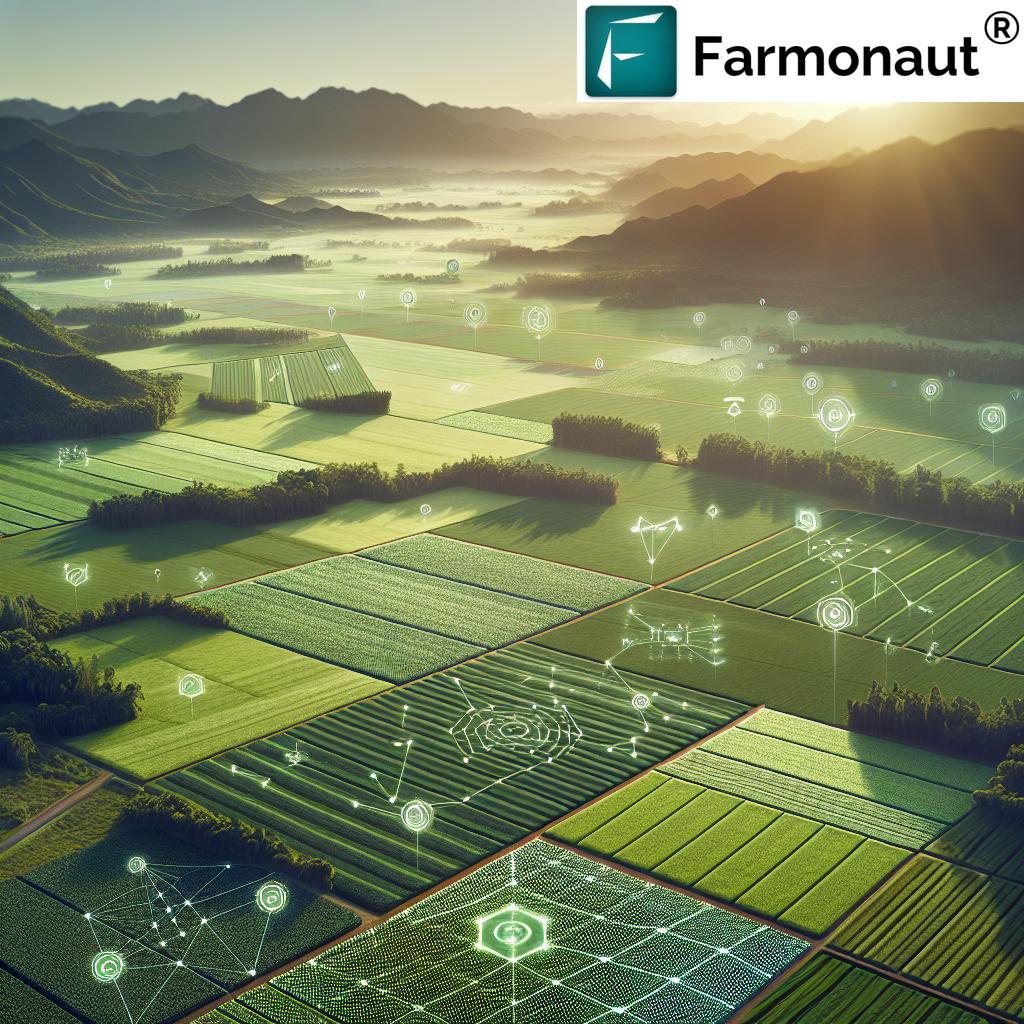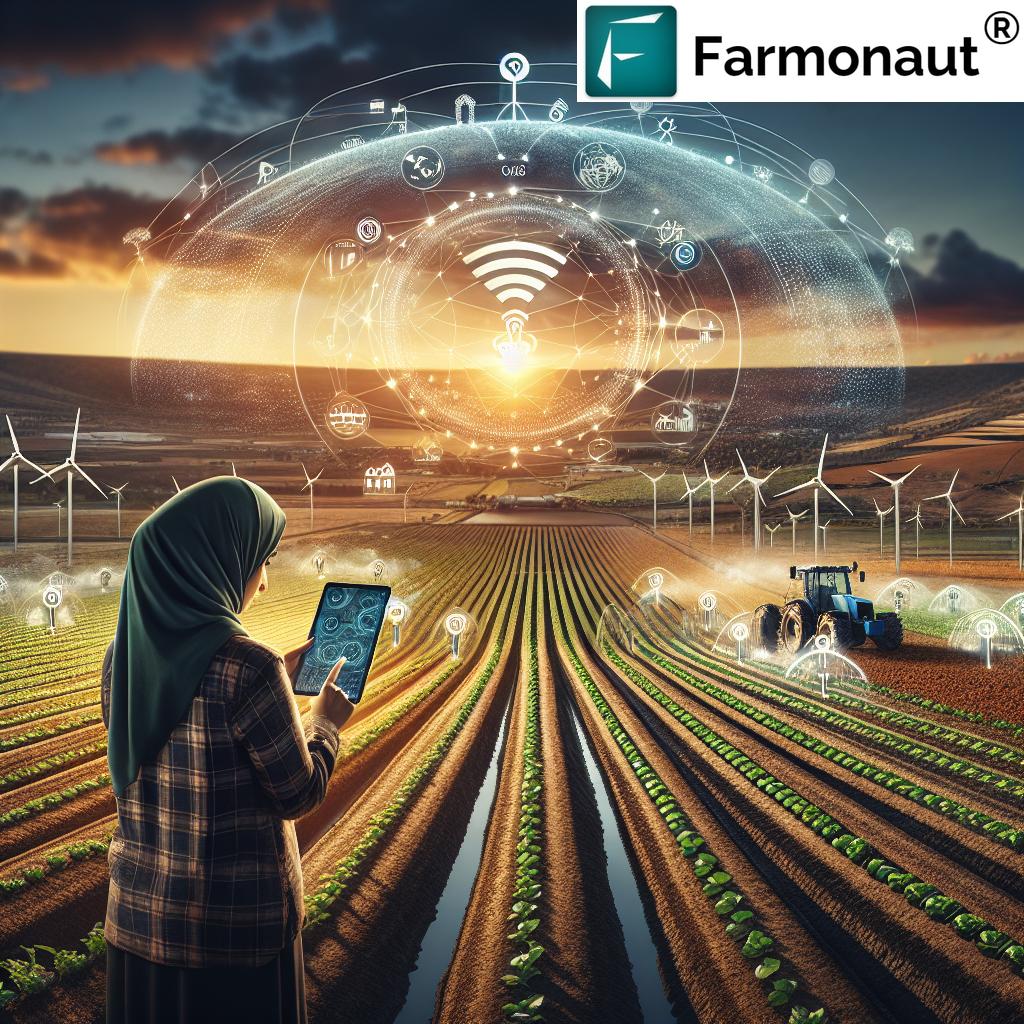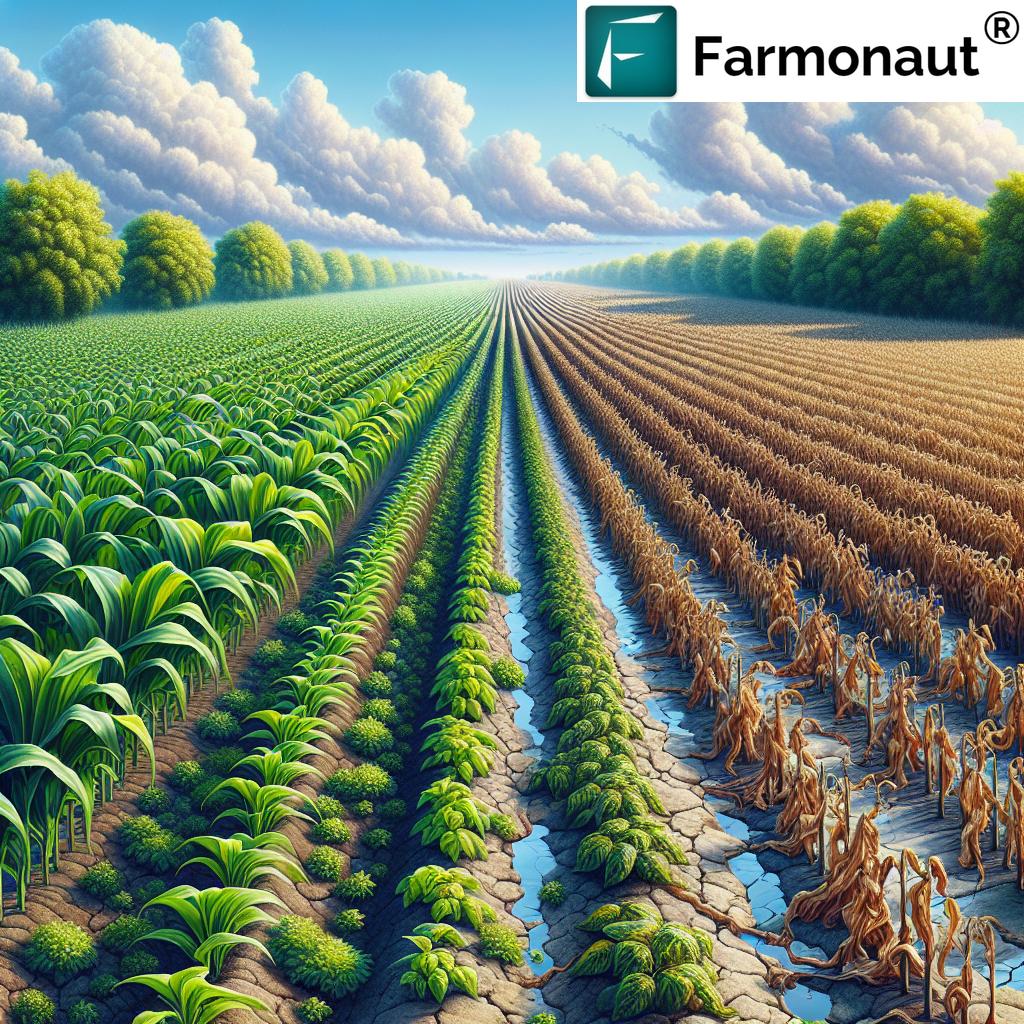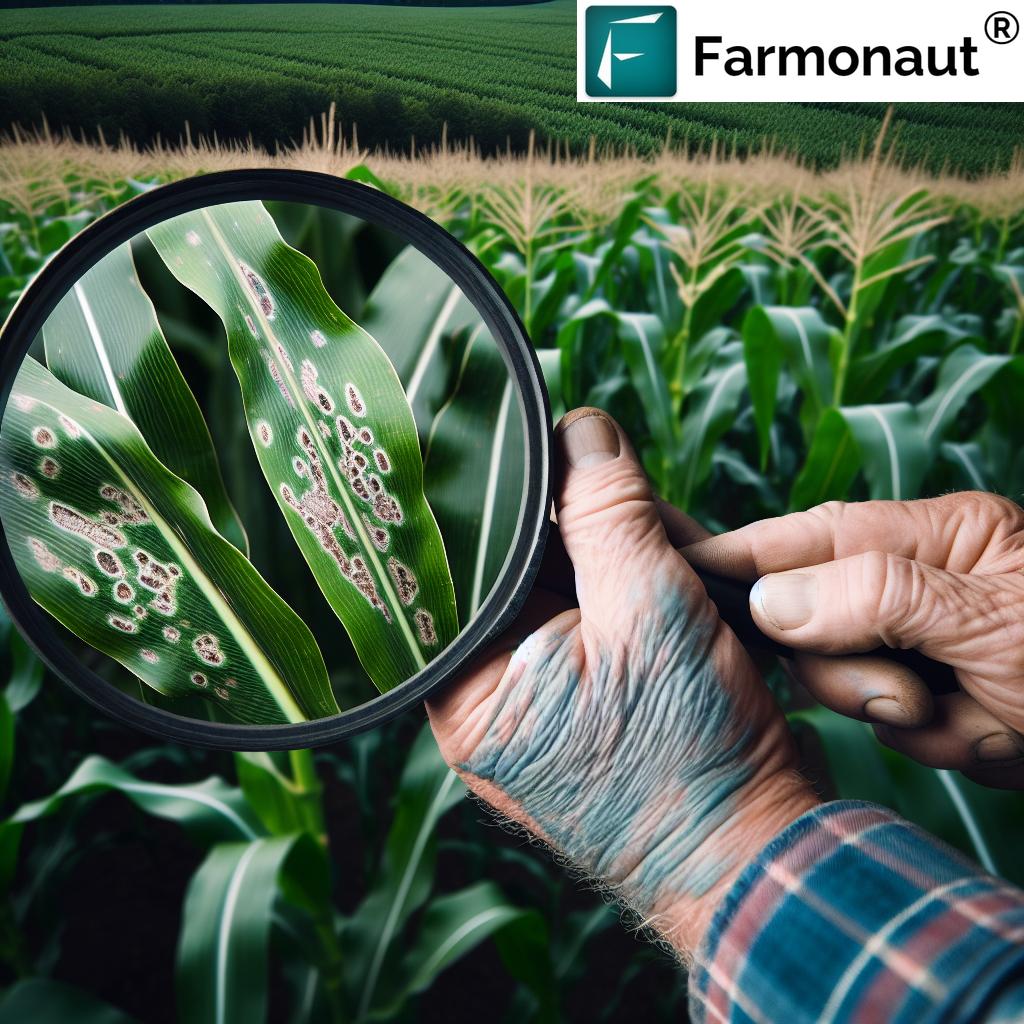AI Agriculture: 7 Shocking Tech Secrets Changing Farming
“AI-powered precision farming can increase crop yields by up to 30% while reducing resource use by 20%.”
Table of Contents
- Introduction: Artificial Intelligence Revolutionizing Agriculture
- Precision Agriculture: The Power of Data
- Crop and Soil Monitoring: Sensing the Future
- Weed Detection and Management: Smarter Control Solutions
- Livestock Health Monitoring: Real-Time Animal Insights
- Autonomous Farm Equipment: Machines that Do More
- Supply Chain Optimization: Farm to Fork Efficiency
- AI-Powered Pest and Disease Detection: Staying Ahead of Challenges
- Soil Health Management & Regenerative Agriculture Technology
- Comparison Table: Key AI Technologies in Agriculture
- Farmonaut: Leading the AI-Powered Agriculture Revolution
- Challenges and Considerations for Adoption
- Frequently Asked Questions
- Conclusion: AI’s Ongoing Impact on Agriculture
- Farmonaut Subscriptions
Introduction: Artificial Intelligence Revolutionizing Agriculture
In today’s rapidly evolving world, AI in agriculture is not just an idea on the horizon — it’s transforming fields, forests, and the entire supply chain. As global challenges like food security, climate change, and resource scarcity intensify, we, as a society, must turn to innovative technologies and data-driven solutions to ensure sustainable growth.
Artificial Intelligence (AI) introduces unprecedented opportunities for farmers, agribusinesses, and policy makers. Through AI-powered precision farming solutions, autonomous equipment, and real-time crop and soil monitoring, we can minimize waste, optimize resource use, and boost yields—all while reducing our environmental impact. Our goal in this comprehensive guide is to demystify the 7 shocking AI tech secrets taking the world of agriculture by storm—empowering everyone to join the digital revolution in farming.
1. Precision Agriculture: The Power of Data
The integration of AI and data analytics in precision agriculture is dramatically changing how we farm. No longer reliant on intuition alone, farmers now leverage real-time data from sensors, drones, and satellite imagery to make informed decisions about planting, irrigation, fertilization, and harvesting.
- AI algorithms process enormous data sets from satellites and drones, identifying patterns in crop health, soil conditions, and climate.
- Automated irrigation systems can analyze soil moisture and weather forecasts, delivering just the right amount of water—conserving resources and ensuring optimal crop growth.
- Farmonaut’s platform makes these precision farming tools accessible and affordable for everyone, eliminating the need for costly hardware investments.
By adopting this data-driven approach to farm management, we see:
- Increased crop yields (up to 30% improvement in some scenarios)
- Reduced resource waste (water, fertilizers, and pesticides)
- More resilient and sustainable farming practices
Our ability to optimize inputs and outputs not only drives profitability for farmers but also plays a significant role in addressing global food security and environmental challenges.
2. Crop and Soil Monitoring: Sensing the Future
Our second AI agriculture secret is the revolution in crop and soil monitoring. The health of our soil is fundamental to sustainable farming and global food security. Thanks to IoT sensors, multi-spectral imaging, and artificial intelligence, we can now monitor even the most subtle changes in plant and soil health.
- Soil sensors measure moisture levels, nutrient concentrations, and pH, transmitting this data in real time to cloud-based platforms.
- Imaging technologies—including those employed by Farmonaut’s satellite-based system—assess vegetation indices (NDVI), detect nutrient deficiencies, and even forecast pest and disease outbreaks.
- AI algorithms use these inputs to detect early signs of stress, disease, or sub-optimal conditions, allowing timely interventions that minimize loss and resource use.
This proactive crop and soil monitoring approach empowers farmers to:
- Implement targeted interventions
- Prevent large-scale crop damage
- Promote sustainability and environmental stewardship
With AI-powered platforms like Farmonaut, we are transforming the landscape of farm management through actionable insights and sustainable precision farming solutions.
Want to know more about crop health assessment and yield prediction? Explore Farmonaut’s advanced monitoring features on the Large-Scale Farm Management page.
3. Weed Detection and Management: Smarter Control Solutions
Weed control has always been a major challenge in agriculture. Traditional weed control methods often lead to overuse of herbicides, increased costs, and environmental concerns. But now, AI technologies such as computer vision and robotics are transforming how we identify and manage weeds.
- AI-powered weed detection systems use machine learning and high-resolution cameras to identify and target weeds with remarkable accuracy.
- Autonomous solutions like the LaserWeeder (using deep learning algorithms) zap weeds without affecting desired crops—minimizing herbicide use.
- This results in reduced chemical use, improved crop health, and environmental sustainability.
Our fight against weeds is now smarter, more sustainable, and tailored for every field, thanks to AI in agriculture.
Looking to manage agricultural fleets for precision weed control and farm optimization? Discover Farmonaut’s Fleet and Resource Management tools.
“Over 70% of large farms are expected to adopt AI-driven soil monitoring by 2025 for sustainable agriculture.”
4. Livestock Health Monitoring: Real-Time Animal Insights
AI isn’t just transforming crop fields—it’s also revolutionizing livestock health monitoring. By equipping animals and farm infrastructure with smart sensors and vision devices, farmers can now monitor animal health, behavior, and productivity in real time.
- Computer vision algorithms watch for early signs of illness, stress, or abnormal behaviors, enabling timely veterinary interventions.
- Automated monitoring systems track feeding patterns, movement, and even reproductive cycles, boosting efficiency and output.
- This not only improves livestock well-being but also supports food safety and farm profitability.
Farmers now have access to AI-powered solutions that bring science and data to animal management, helping us ensure a secure and sustainable food supply chain.
To see how smart farm management can be centralized and simplified, check out Farmonaut’s Large-Scale Farm Management app.
5. Autonomous Farm Equipment: Machines that Do More
One of the most exciting developments in AI agriculture is the arrival of autonomous farm equipment that can plow, sow, weed, and harvest—without human intervention.
- Equipped with GPS and sensors, these machines navigate fields with precision, reducing labor costs and crop damage.
- Robotics and AI allow these machines to adapt to changing field conditions, ensuring high efficiency and consistent results.
By integrating autonomous equipment with data-driven management platforms (like Farmonaut’s Agro Admin App), farmers can achieve:
- Maximized field productivity
- Reduced operational costs
- Simplified, scalable farm operations
With these technological innovations, we are not just increasing yields; we are reimagining the future of work in agriculture.
6. Agricultural Supply Chain Optimization: Farm to Fork Efficiency
In our interconnected food system, supply chain optimization is crucial for minimizing waste, ensuring product quality, and maintaining transparency. AI-powered supply chain solutions aggregate real-time data from IoT sensors—tracking product location, conditions, and status from farm to consumer.
- Temperature and humidity sensors relay data to AI algorithms that recommend optimal storage and transport decisions, safeguarding crops against spoilage.
- Blockchain integration—as offered in Farmonaut’s Product Traceability solutions—ensures every product journey is auditable, secure, and transparent. This fosters consumer trust and fights fraud.
- Optimization algorithms ensure that produce gets to market efficiently, helping meet demand and cut down on food waste.
Learn more about transparent and efficient supply chains at Farmonaut’s Product Traceability platform.
7. AI-Powered Pest and Disease Detection: Staying Ahead of Challenges
Pest infestations and plant diseases are perpetual threats to crop productivity. Early and accurate detection is vital—and this is where AI applications truly shine!
- Machine learning and computer vision analyze images and sensor data to identify early warning signs, long before symptoms are visible to the naked eye.
- This allows for prompt, targeted interventions—using less pesticide and reducing environmental impact.
- Automated alert systems notify farmers and agronomists of imminent risks, helping protect yields and prevent outbreaks.
With platforms driven by AI-powered pest and disease detection, both large and small farms can achieve sustainable farming practices that are both efficient and resilient.
For expert advisory solutions tailored to disease and pest management, explore Farmonaut’s Jeevn AI Advisory System available via Farmonaut’s Mobile and Web Apps.
Soil Health Management & Regenerative Agriculture Technology
At the core of sustainable agriculture lies the health of our soils. AI-driven soil health management combines smart sensors, imaging, and data analytics to maintain fertility and structure for generations to come. We’re also witnessing the emergence of regenerative agriculture technology that helps sequester carbon and reverse land degradation.
- Spectral sensors (including satellite-based systems like Farmonaut’s) monitor key indicators: soil organic carbon, moisture, nutrient levels, and more.
- AI algorithms analyze trends, forecast nutrient needs, and deliver optimized irrigation and fertilization schedules.
- Carbon Footprinting solutions help agribusinesses measure, report, and minimize their environmental impact.
- Automated soil sampling and digital soil maps accelerate adoption of regenerative practices on farms worldwide.
Farmonaut’s commitment to sustainable agriculture is strengthened by carbon measurement & tracking tools—empowering farmers and agribusinesses to address climate change and harness regenerative agriculture technology.
Learn how easy it is to integrate these tools into your farm by accessing Farmonaut’s iOS, Android, and Web Apps.
Comparison Table: Key AI Technologies in Agriculture
| AI Technology | Primary Agricultural Application | Estimated Yield Improvement (%) | Resource Savings (%) | Key Benefit |
|---|---|---|---|---|
| Precision Soil Monitoring | Optimize soil nutrient, pH, and moisture | 10-30% | 20-50% | Boosts crop health and reduces water/fertilizer waste |
| Drone-Based Crop Analysis | Remote crop health and stress detection | 15-25% | 20-30% | Early disease detection; targeted interventions |
| Automated Irrigation Systems | Precise water delivery and scheduling | 5-20% | 30-50% | Water conservation and drought resilience |
| Pest/Disease Prediction & Control | Monitor and identify pests/diseases via ML/vision | 10-20% | 15-35% | Reduces pesticide use, crop losses, and environmental impact |
| Robotic Weeding & Harvesting | Automated weed removal, crop collection | 10-25% | 10-40% | Reduces labor costs, increases efficiency |
| Supply Chain Optimization Algorithms | Streamline storage, transport, and quality tracking | 5-15% | 10-20% | Minimizes food waste, improves traceability |
| Satellite-Based Monitoring (e.g., Farmonaut) | Large-scale farm, forest, and plantation insights | 10-30% | 15-40% | Scalable, affordable AI-driven management for all farm sizes |
Farmonaut: Leading the AI-Powered Agriculture Revolution
As we have seen, AI in agriculture is reshaping the way entire regions pursue food security, adapt to climate change, and build resilient supply chains. But making these benefits widespread requires accessible, practical platforms. This is where Farmonaut stands out as a true pioneer.
- Satellite-Based Crop Health Monitoring: Farmonaut leverages state-of-the-art satellite imagery and AI algorithms to monitor fields, providing real-time data on crop health, NDVI, soil moisture, and much more. This empowers all farmers—from smallholders to large agribusinesses—to make informed, timely decisions.
- Jeevn AI Advisory System: Delivers custom, AI-based recommendations for irrigation, fertilization, and disease/pest management directly to a farmer’s device.
- Blockchain-Based Traceability: Ensures every farmer, agribusiness, and corporate client can offer transparent, fraud-proof product journeys to consumers. Learn how companies track and prove product origin with Farmonaut Product Traceability tools.
- Fleet & Resource Management: Efficiently manage equipment, optimize fleet use, and reduce operational costs with Farmonaut’s Resource Management platform.
- Carbon Footprinting: Monitor and minimize environmental impact with real-time carbon emission tracking—supporting sustainability and compliance. Try Farmonaut’s Carbon Footprinting solution now.
-
APIs and Developer Access: Farmonaut offers robust APIs for satellite and weather data to fostering innovation and seamless integration.
Developers can find technical help at the API Developer Docs. - Flexible Subscription Model: Farmonaut delivers affordable, scalable access to AI-empowered farm management tools. Choose a package tailored to your needs—whether you farm 1 hectare or 100,000.
Our commitment is to democratize data-driven agriculture, supporting everyone from individual farmers to global enterprises in adopting sustainable farming practices that address challenges like food security and climate change head on.
With a full suite of cloud and mobile apps (Web, Android, and iOS), Farmonaut makes precision farming solutions available anytime, anywhere.
Ready to try it? Download or access Farmonaut apps now!
Challenges and Considerations for Adoption
Despite the immense promise of AI in agriculture, several challenges remain that we must collectively address for broader adoption and equitable benefit:
- Data Privacy & Security: The vast amount of data generated by sensors and satellites must be managed with strong privacy protections.
- Infrastructure & Investment: Widespread access requires significant infrastructure—from mobile connectivity to affordable devices and training.
- Standardization & Interoperability: Data and platforms must be standardized to ensure compatibility and avoid future bottlenecks.
- Supporting Smallholder Farmers: Ensuring the benefits of AI-powered agriculture reach everyone—especially those in Asia, Africa, and Latin America—demands targeted outreach and capacity-building initiatives.
Initiatives like affordable, user-friendly apps, satellite-based loan verification, and open API access (offered by Farmonaut) are paving the way for greater inclusivity and resilience in farm communities worldwide.
Frequently Asked Questions
What is AI in agriculture?
AI in agriculture refers to the use of artificial intelligence, machine learning, data analytics, and computer vision to enhance traditional and modern farming methods. Applications include precision farming, crop and soil monitoring, pest and disease detection, supply chain optimization, and sustainable farm management.
How does Farmonaut use AI in farm management?
Farmonaut leverages satellite imaging, AI algorithms, and blockchain to provide real-time, data-driven recommendations for crop health, soil moisture levels, irrigation, and resource allocation. The platform’s Jeevn AI delivers personalized farm advisories and risk alerts directly to users, helping optimize inputs and maximize yields.
What are the main benefits of precision farming solutions?
Precision farming solutions enable targeted input application, reduced waste, increased yields, and improved environmental sustainability. By analyzing sensor and satellite data, farmers can make informed decisions about when, where, and how to deploy resources for best results.
Can smallholder farmers benefit from AI-driven technology?
Yes! With platforms like Farmonaut, smallholder farmers gain affordable access to precision agriculture without the need for expensive hardware. User-friendly apps and scalable subscription models mean that every farmer—from solo workers to large cooperatives—can take part in the AI revolution.
Is Farmonaut available as an API for integration on other platforms?
Absolutely. Farmonaut provides robust API access to satellite and weather data. See our Developer Docs for technical details and easy onboarding.
How does AI help in carbon footprint tracking for agriculture?
AI-powered carbon footprinting solutions monitor emissions from agricultural operations, analyze practices, and recommend ways to cut environmental impact. Farmonaut’s carbon tracking tool provides real-time metrics and compliance support for sustainable operations.
Conclusion: AI’s Ongoing Impact on Agriculture
We stand at a turning point where AI in agriculture is revolutionizing every aspect of food, fiber, and forestry. From precision farming and regenerative agriculture technology to autonomous equipment and blockchain-based traceability, these advancements drive productivity, sustainability, and resilience—securing our future in a dynamic world.
By embracing these AI-powered solutions, we collectively minimize waste, protect our environment, ensure global food security, and empower farmers worldwide. Accessible, affordable, and scalable platforms—like those offered by Farmonaut—will be pivotal for equitable, sustainable progress.
Are you ready to join the agricultural revolution? Download the Farmonaut app and experience the future of data-driven farming today.
Farmonaut Subscriptions
Choose from a variety of flexible, scalable plans designed for farmers, agribusinesses, and institutions.
Get all the power of AI-driven farm management, crop monitoring, traceability, and carbon tracking with Farmonaut’s user-friendly subscriptions.






